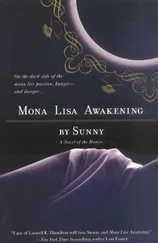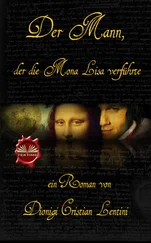I smiled back. The gesture was slightly forced, but certainly more genuine than it had been for Claudio.
“Madonna Lisa,” he said, standing over me, and took my hands. “It is wonderful to see you again! I trust you are well?”
“Very, yes. You look well yourself; Milan must agree with you. Have you been in Florence long?”
“Not at all. And how is your family? Matteo?”
“Everyone is fine. Matteo just keeps growing and growing. He’s running now. He wears us all out.” I gave a little laugh, hoping that Leonardo would assume my exhaustion was the result of motherhood.
He let go my hands and took a step back, assessing me. “Good. All good. Salai says you have something to report today. Shall we get it over with quickly, then?” He folded his arms. Unlike Salai, who wrote everything down, Leonardo simply listened to my recitations.
“All right, then.” I cleared my throat; I felt a slight surge of heat on my face and realized, to my utter disgust, that I had blushed. “I’m sorry,” I said, with a sheepish little smile. “I didn’t sleep well last night and I’m rather tired, but… I’ll do my best.”
“Of course,” he said. Watching.
I drew in a determined breath and began. The first seven sentences of the letter came easily; I could see it in my mind, in the dark, thick handwriting, just as it had appeared on the page. And then, without intending to, I began: “And now you would see it all undone? Or shall I give you the benefit of the doubt-”
I broke off, absolutely panicked. I knew how the phrase should be finished: and credit Antonio with this? But I dared not say my father’s name; yet I was obliged to complete the thought. “I’m sorry,” I said again, then continued, “and credit our friend with this?” At that point, in order to make the letter seem all of a piece, I recited all the lines that referred to my father, taking care to replace his name with the phrase our friend . And I exerted my full concentration so that I would not stumble when I omitted the line or make use of the daughter and grandchild .
When I was finished, I looked to Leonardo. He reacted not at all; he simply stood gazing at me, his face composed and neutral, his eyes intense.
The long silence left me dizzied; I lowered my gaze and was sickened to realize my cheeks were reddening again.
At last, his voice soft and free of reproach, he spoke. “You are a poorer spy than I gave you credit for, Lisa. You can’t hide the fact that you are lying.”
“I’m not!” I said, but I couldn’t look at him.
He sighed; his tone was resigned, sad. “Very well. I’ll put it another way: You are hiding the truth. I think you know who ‘our friend’ is. Perhaps I should ask you to recite that particular line for me again and again… until you finally tell it to me as it was written.”
I was furious with myself, ashamed. Through my own stupidity, I had betrayed the man who most needed my trust. “I’ve told you what you need to know of the letter. You can’t-you think you know everything, but you don’t.”
He remained calm, sad. “Madonna… you won’t be telling me something I don’t already know. I understand that you want to protect him, but it’s too late for that.”
I closed my eyes. When I opened them again, I said, “You must promise me that no one will hurt him. That no harm will come to him… If I thought that you, that Piero, was a danger to him, I-”
“Lisa,” he said. His tone was sharp. “You are trying to protect someone who isn’t worthy of your protection.” He turned his face toward the window. “I had hoped this moment would never arrive, that you would be spared. I see now, of course, that it was only a matter of time.”
“If you hurt him, I won’t help you.” My voice shook.
“Salai!” he called, so loudly that I started, thinking at first that he was shouting at me. “Salai!”
In a moment, Salai appeared in the doorway, grinning; at the sight of us, his good humor evaporated.
“Watch her,” Leonardo commanded. He left the room. After a moment, I could hear him shuffling about in the next chamber, searching for something.
When he returned, he held a folio in his hand; he dismissed Salai with a curt nod. Then he took the folio over to the long table against the far wall, and opened it, and began going through the drawings-a few done in charcoal, some in ink, most in meltingly delicate red-brown chalk-until he found the one he sought.
He laid his forefinger on it firmly, accusatorily.
I moved to stand beside him; I looked down at the drawing.
“You were right,” he said. “I made a sketch immediately after the event and kept it for a very long time. This is one I made recently, in Milan. After you asked me, I realized the time might come for you to see it.”
It was a fully rendered drawing of a man’s head, with a hint of the neck and shoulders. He was in the act of turning to look over his shoulder far, far behind him. He was draped in a cowl, which hid his hair, his ears, and left most of his face in shadow. Only the tip of his nose, chin, and mouth were visible.
The man’s lips were parted, one corner drawn lower as his face turned; in my mind, I could hear his gasp. Although the eyes were hidden in blackness, his terror, his spent anger, his dawning regret were conveyed surely in the one brilliant, horrified downward turn of the lower lip, in the straining muscles of his neck.
I looked at the man. I felt I knew him, but I had never seen him before. “This is the penitent,” I said. “The man you saw in the Duomo.”
“Yes. Do you recognize him?”
I hesitated and at last said, “No.”
He cleared a space upon the table, took the drawing from the portfolio, and set it down. “I did not learn what I am about to show you until recently.” He took up a piece of crumbling red chalk and beckoned for me to stand close beside him.
And he began to draw with the same natural ease that another man might use to walk or breathe. He made light, staccato strokes over the jaw first, and the chin; it took me a moment to realize he was drawing hair, a beard. As he did, the penitent’s jaw softened; the upper lip disappeared beneath a full mustache. He drew a pair of lines, and the corners of the man’s mouth were suddenly braced by age.
Slowly, beneath his hand, appeared a man I knew, a man I had seen every day of my life.
I turned away. I closed my eyes because I did not want to see more.
“You recognize him now.” Leonardo’s voice was very soft and unhappy.
I nodded, blind.
“His involvement was not born of innocence, Lisa. He was part of the conspiracy from the beginning. He joined not out of piety, but out of jealousy, out of hate. He does not merit anyone’s protection. He destroyed Anna Lucrezia. Destroyed her.”
I turned my back on him, on the drawing. I took a step away.
“Did you go to him, Lisa? Did you say anything to him? Did you speak to him of me, of Piero?”
I went to my chair and sat. I clasped my hands and leaned forward, elbows on my knees. I wanted to be sick. I had worn my knife that day, hungry for the moment I would meet the third man.
Leonardo remained next to the table, the drawing, but he faced me. “Please answer. We are dealing with men who do not shrink from murder. Did you go to him? Did you say anything to him, to anyone?”
“No,” I said.
I had told Leonardo half the truth-that I had said nothing about him or about Francesco’s letters. Perhaps it was the half truth that showed on my face, in my aspect, for Leonardo asked me no further questions. But even he, for all his charm, could not convince me to sit for him that day, nor could he interest me in conversing about all that had happened since we last had met. I returned home early.
Читать дальше
Конец ознакомительного отрывка
Купить книгу












